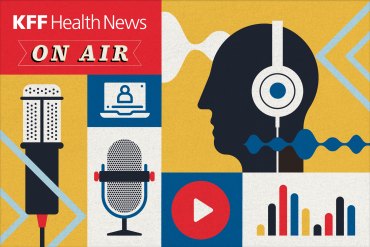Journalists Give Insights Into Opioid Settlements and Picking a Nursing Home
KFF Health News and California Healthline staff took to the airwaves recently to discuss topical stories. Here’s a collection of their appearances.
Journalists Explore Breast Cancer Rates and the Medical Response to Mass Shootings
KFF Health News and California Healthline journalists made the rounds on local and state media recently to discuss topical stories. Here’s a collection of their appearances.
Polémica estrategia contra la violencia con armas de fuego pone a policías armados en las escuelas
Para los sistemas escolares, la amenaza de los tiroteos ha influido en una difícil toma de decisiones, ya que los administradores deben tener en cuenta el miedo, el deber y las estadísticas confusas para proteger a las escuelas de este peligro.
The First Year of Georgia’s Medicaid Work Requirement Is Mired in Red Tape
Georgia must decide soon whether to try to extend a limited Medicaid expansion that requires participants to work. Enrollment fell far short of goals in the first year, and the state isn’t yet able to verify participants are working.
‘What Happens Three Months From Now?’ Mental Health After Georgia High School Shooting
The recent shooting at Apalachee High School outside of Atlanta caused more than physical wounds. Medical experts worry a lack of mental health resources in the community — and in Georgia as a whole — means few options for those trying to cope with trauma from the shooting.
Fearing the Worst, Schools Deploy Armed Police To Thwart Gun Violence
Officials reason that vigilance and familiarity with campuses would speed responses to shootings. But there is scant research about armed police in schools — and some studies suggest that racial bias in policing offers cause for caution.
Journalists Give Rundown on Bird Flu Risks, HIV Rates, and the Fate of Shuttered Hospitals
KFF Health News and California Healthline staff made the rounds on state and local media in recent weeks to discuss topical stories. Here’s a collection of their appearances.
As Record Heat Sweeps the US, Some People Must Choose Between Food and Energy Bills
An increasing number of Americans struggle with energy poverty, the inability to adequately heat or cool one’s dwelling. Health officials and climate experts are sounding the alarm as record-breaking heat sweeps the nation.
Errors in Deloitte-Run Medicaid Systems Can Cost Millions and Take Years To Fix
As states wait for Deloitte to make fixes in computer systems, Medicaid beneficiaries risk losing access to health care and food.
The New Covid Vaccine Is Out. Why You Might Not Want To Rush To Get It.
Although public health officials recommend the newly approved covid vaccine for everyone 6 months and older, it may make more sense to wait until closer to the holiday season.
Ya está disponible la nueva vacuna contra covid, pero piensa bien cuándo conviene vacunarte
La Administración de Drogas y Alimentos ha aprobado una vacuna actualizada contra covid para todas las personas de 6 meses en adelante, lo que renueva un dilema que ahora es anual: ¿Recibir la vacuna ya, con el brote de covid aún por todo el país, o reservarla para la ola invernal?
A Teen’s Murder, Mold in the Walls: Unfulfilled Promises Haunt Public Housing
For years, federal lawmakers have failed to deliver the money needed to fix derelict public housing, leaving tenants — mostly people of color and families with low incomes — living with mold and gun violence that has had lasting health consequences.
Inside the Political Fight To Build a Rural Georgia Hospital
Political drama involving a rural Georgia county reflects how state regulations that govern when and where hospitals can be built or expanded are evolving.
Bipartisan Effort Paves Way for Reviving Shuttered Hospitals in Georgia
“Certificate of need” laws, largely supported by the hospital industry, limit health facility construction in 35 states and Washington, D.C. Georgia lawmakers decided its law was complicating the reviving of two hospitals critical to their communities.
Journalists Highlight Maternal Health Challenges in Rural America, From Iowa to Georgia
KFF Health News and California Healthline staff took to the airwaves in the last couple of weeks to discuss maternal health care challenges in rural areas. Here’s a collection of their appearances.
The Politics Holding Back Medicaid Expansion in Some Southern States
Ten states have not expanded Medicaid, leaving 1.5 million people ineligible for the state and federal insurance program and also unable to afford private insurance. Seven of those states are in the South, where expansion efforts may have momentum but where lawmakers say political polarization is holding them back.
Social Media Bans Could Deny Teenagers Mental Health Help
Congress and state legislatures are considering age bans and other limits for Instagram and TikTok out of concern that they harm kids’ mental health. But some researchers and pediatricians question whether there’s enough data to support that conclusion.
Maternity Care in Rural Areas Is in Crisis. Can More Doulas Help?
Rural communities are losing access to maternity care, raising the risk of pregnancy complications, especially for Black women, who face higher rates of maternal mortality. Now, a Georgia medical school is trying to help by training doulas, practitioners who offer patients extra support before, during, and after childbirth.
Journalists Drill Down on Ongoing Covid Risks, Escalating Health Care Costs
KFF Health News and California Healthline staff made the rounds on national and local media in the last two weeks to discuss topical stories. Here’s a collection of their appearances.
Journalists Discuss Abortion in GOP Platform and How Idaho’s Ban Drove Away OB-GYNs
KFF Health News and California Healthline staff made the rounds on national and local media in the last couple of weeks to discuss topical stories. Here’s a collection of their appearances.




















